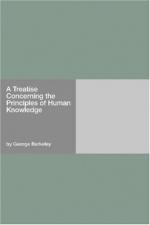81. You will reply, perhaps, that in the fore-said definition is included what doth sufficiently distinguish it from nothing—the positive abstract idea of quiddity, entity, or existence. I own, indeed, that those who pretend to the faculty of framing abstract general ideas do talk as if they had such an idea, which is, say they, the most abstract and general notion of all; that is, to me, the most incomprehensible of all others. That there are a great variety of spirits of different orders and capacities, whose faculties both in number and extent are far exceeding those the Author of my being has bestowed on me, I see no reason to deny. And for me to pretend to determine by my own few, stinted narrow inlets of perception, what ideas the inexhaustible power of the Supreme Spirit may imprint upon them were certainly the utmost folly and presumption—since there may be, for aught that I know, innumerable sorts of ideas or sensations, as different from one another, and from all that I have perceived, as colours are from sounds. But, how ready soever I may be to acknowledge the scantiness of my comprehension with regard to the endless variety of spirits and ideas that may possibly exist, yet for any one to pretend to a notion of Entity or Existence, abstracted from spirit and idea, from perceived and being perceived, is, I suspect, a downright repugnancy and trifling with words.—It remains that we consider the objections which may possibly be made on the part of Religion.
82. Objections derived from the scriptures answered.—Some there are who think that, though the arguments for the real existence of bodies which are drawn from Reason be allowed not to amount to demonstration, yet the Holy Scriptures are so clear in the point as will sufficiently convince every good Christian that bodies do really exist, and are something more than mere ideas; there being in Holy Writ innumerable facts related which evidently suppose the reality of timber and stone, mountains and rivers, and cities, and human bodies. To which I answer that no sort of writings whatever, sacred or profane, which use those and the like words in the vulgar acceptation, or so as to have a meaning in them, are in danger of having their truth called in question by our doctrine. That all those things do really exist, that there are bodies, even corporeal substances, when taken in the vulgar sense, has been shown to be agreeable to our principles; and the difference betwixt things and ideas, realities and chimeras, has been distinctly explained. See sect. 29, 30, 33, 36, &c. And I do not think that either what philosophers call Matter, or the existence of objects without the mind, is anywhere mentioned in Scripture.
83. No objection as to language tenable.—Again, whether there can be or be not external things, it is agreed on all hands that the proper use of words is the marking our conceptions, or things only as they are known and perceived by us; whence it plainly follows that in the tenets we have laid down there is nothing inconsistent with the right use and significancy of language, and that discourse, of what kind soever, so far as it is intelligible, remains undisturbed. But all this seems so manifest, from what has been largely set forth in the premises, that it is needless to insist any farther on it.




